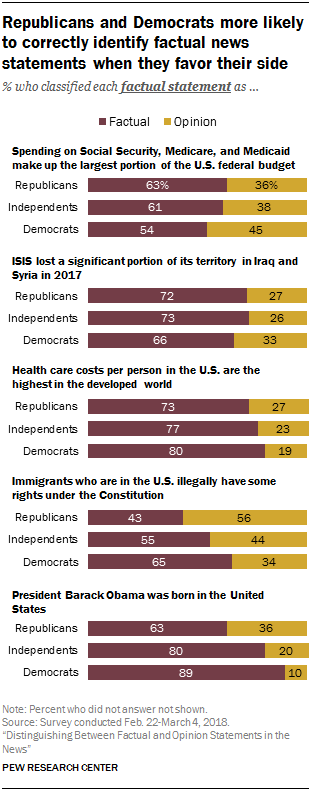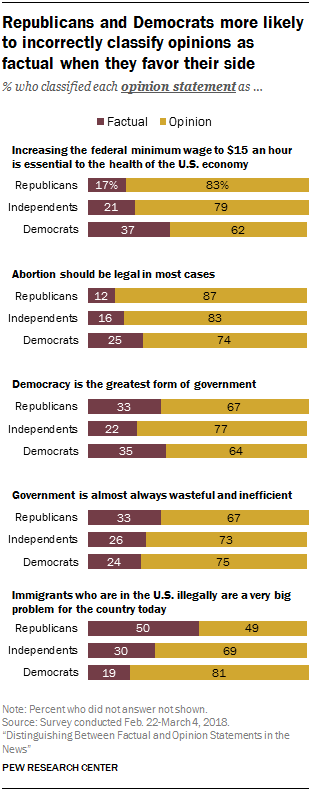 In addition to past research that has shown stark differences between Republicans’ and Democrats’ trust of specific news outlets, the findings in this study go one step further, showing that those who identify with the two parties often differ in how they classify specific news content as factual or opinion.
In addition to past research that has shown stark differences between Republicans’ and Democrats’ trust of specific news outlets, the findings in this study go one step further, showing that those who identify with the two parties often differ in how they classify specific news content as factual or opinion.
Overall, majorities of both Republicans and Democrats correctly classified nearly all factual and opinion statements asked about. But Democrats were more likely to correctly classify a factual statement and to incorrectly classify an opinion as factual when it was more amenable to the left – and the same held for Republicans when the appeal was to the right. Some of these differences are quite large, with five of the 10 in the double digits.
As noted earlier, the goal was to include an equal number of statements in the study that would appeal to the sentiments of the left as of the right, maintaining an overall ideological balance. Even though most factual and opinion statements appealed more to either the left or the right, majorities of Republicans and Democrats correctly identified nearly all of them. There were only two instances across the factual and opinion statements in which no more than 50% of either party correctly classified them.
However, how large of a majority this was for each party often differed, sometimes substantially. Democrats were much more likely to correctly identify the two factual statements that were more favorable to the left. The statement “President Barack Obama was born in the United States” was classified as factual by 89% of Democrats, compared with 63% of Republicans. And “Immigrants who are in the U.S. illegally have some rights under the Constitution” was classified as factual by 65% of Democrats versus 43% of Republicans.
Democrats were also somewhat more likely than Republicans to correctly identify one additional statement – one that was intended to appeal to both sides equally: “Health care costs per person in the U.S. are the highest in the developed world.” Eight-in-ten Democrats identified the statement as factual versus 73% of Republicans. This gap, though, was roughly a third as large as for the statements intended to be more favorable to the left.
To a lesser degree, the same pattern emerged – albeit with the parties reversed – for the factual statements that appealed more to the right. Republicans (63%) were somewhat more likely than Democrats (54%) to correctly identify “Spending on Social Security, Medicare, and Medicaid make up the largest portion of the U.S. federal budget” as factual. And 72% of Republicans, compared with 66% of Democrats, identified “ISIS lost a significant portion of its territory in Iraq and Syria in 2017” as factual.
Overall, there was a modest difference between the two parties in the portion who answered more correctly than incorrectly – but not of the same magnitude as between those with more or less political awareness, digital savviness and trust in the information from national news organizations. Across these five factual statements, 78% of Democrats answered at least three of the five correctly, compared with 68% of Republicans. However, it should be noted that this difference may be a function of the statements themselves. The factual statements appealing to one side may have been more divisive or provocative than those that appealed to the other side. In other words, these findings should not be taken to imply that one party is better able to classify factual statements than the other – but that the appeal seems to matter at least to a certain degree to both sides.
 Members of both political parties are also more likely to incorrectly label opinion statements as factual when they are amenable to their side. Overall, some large divisions – up to 32 percentage points – emerge between both parties in identifying opinions.
Members of both political parties are also more likely to incorrectly label opinion statements as factual when they are amenable to their side. Overall, some large divisions – up to 32 percentage points – emerge between both parties in identifying opinions.
Republicans were less likely than Democrats to correctly identify the two opinion statements that appeal more to the right. Nearly half of Republicans (49%) classified “Immigrants who are in the U.S. illegally are a very big problem for the country today” as opinion versus 81% of Democrats, and “Government is almost always wasteful and inefficient” was classified as opinion by 67% of Republicans versus 75% of Democrats.
Likewise, Democrats were less likely to correctly identify the opinion statements amenable to the left. About six-in-ten Democrats (62%) classified “Increasing the federal minimum wage to $15 an hour is essential to the health of the U.S. economy” as an opinion versus 83% of Republicans, while “Abortion should be legal in most cases” was classified as opinion by 74% of Democrats versus 87% of Republicans. The parties were on par in classifying “Democracy is the greatest form of government,” the statement intended to appeal equally to both sides, as an opinion, with 67% of Republicans and 64% of Democrats doing so.
With the two borderline statements, Republicans were more likely than Democrats to classify each as opinions. About eight-in-ten Republicans (82%) said that “Applying additional scrutiny to Muslim Americans would not reduce terrorism in the U.S.” is an opinion, compared with two-thirds of Democrats (67%). For the statement “Voter fraud across the U.S. has undermined the results of our elections,” Republicans were 7 percentage points more likely than Democrats to say it is an opinion (71% vs. 64%, respectively).
With a few exceptions, independents fell somewhere in between Republicans and Democrats in their classification of the 12 statements.


